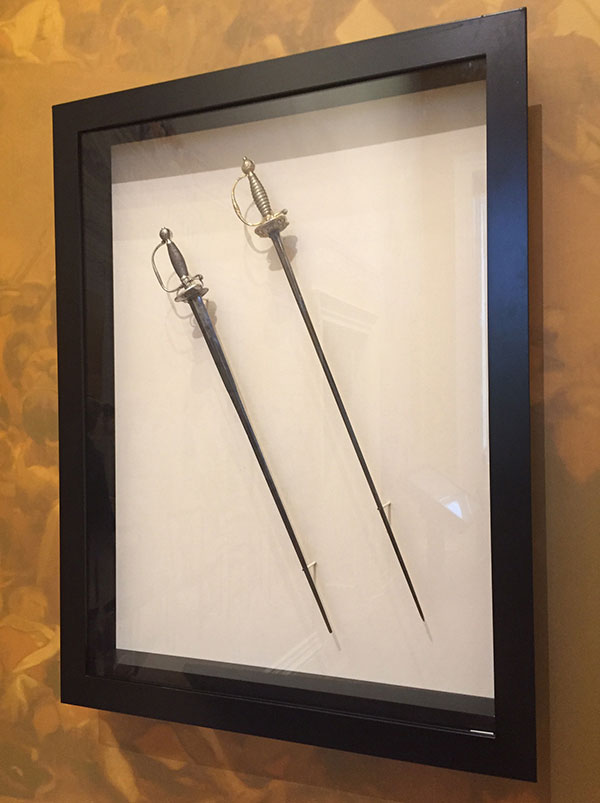 The two swords belonging
to Tench Tilghman were left to the state by Mrs. Judith Goldsborough Oates
who died on December 26, 1997. Mrs. Oates was a direct descendent of Tench
Tilghman. The larger sword is made of silver with gold inlay and is the
one worn by Col. Tilghman in the portrait
of Washington, Lafayette & Tilghman at Yorktown which hangs
in the Old Senate Chamber. The sword is clearly depicted by the artist Charles Willson Peale. The history of
the portrait and Washington's own words show the importance Tilghman's
faithful service and friendship during the War. According to family tradition,
the other sword was passed down to Tench Tilghman from his great-great-grandfather,
Michael Turbutt.
The two swords belonging
to Tench Tilghman were left to the state by Mrs. Judith Goldsborough Oates
who died on December 26, 1997. Mrs. Oates was a direct descendent of Tench
Tilghman. The larger sword is made of silver with gold inlay and is the
one worn by Col. Tilghman in the portrait
of Washington, Lafayette & Tilghman at Yorktown which hangs
in the Old Senate Chamber. The sword is clearly depicted by the artist Charles Willson Peale. The history of
the portrait and Washington's own words show the importance Tilghman's
faithful service and friendship during the War. According to family tradition,
the other sword was passed down to Tench Tilghman from his great-great-grandfather,
Michael Turbutt.
The swords were accepted for the state by Governor Parris N. Glendening
and the Board of Public Works on February 4, 1998 and were installed in
the Old Senate Chamber on February 16 at a ceremony with the Maryland Senate
in honor of George Washington's birthday. The gift of the swords was reported
in an article in the Baltimore
Sun on February 4 which featured State Archivist Edward C. Papenfuse and
Archives' Conservation Officer Hanna Sczcepanowska who prepared the swords
for presentation and permanent exhibition.
"...zealous servant and slave to the public"
Tench Tilghman was born on December 25, 1744 in Talbot County on his
father's plantation. He was educated privately until the age of 14, when
he went to Philadelphia to live with his grandfather, Tench Francis. In
1761, he graduated from the College and Academy of Philadelphia, which
later became the University of Pennsylvania, and then went into business
with his uncle Tench Francis, Jr. until just before the Revolutionary War.
Tench Tilghman's public service began with his appointment by Congress
to a commission established to form treaties with the Six Nations of Indian
tribes. In 1776, Tilghman was commissioned captain in the Pennsylvania
Battalion of the Flying Camp. In August 1776, he joined George Washington's
staff as aide-de-camp and secretary. He served without pay until May 1781,
when Washington, calling him a "zealous servant and slave to the public,
and faithful assistant to me for nearly five years," procured for him a
regular commission in the Continental Army. Following the victory at Yorktown,
Washington rewarded him with the honor of carrying the Articles of Capitulation
to the Continental Congress in Philadelphia.
After the War, Tilghman returned to Maryland where he resumed his career
in business in Baltimore and married his cousin, Anna Marie Tilghman. They
had two daughters, Anna Margaretta and Elizabeth Tench. Tilghman died on
April 18, 1786 at the age of 41. George Washington said of his long-time
assistant: "None could have felt his death with more regret than I did,
because no one entertained a higher opinion of his worth or had imbibed
sentiments of greater friendship for him than I had done."